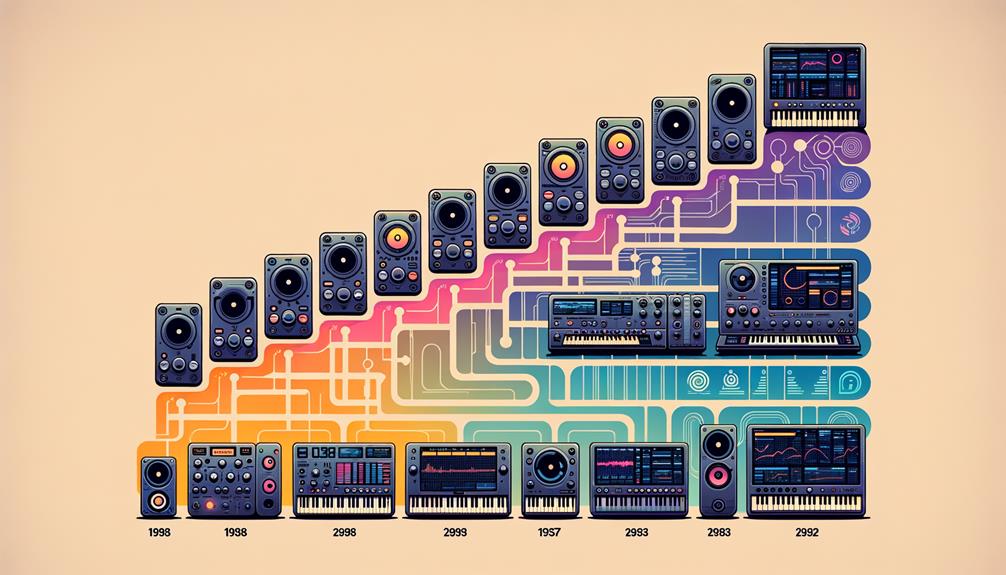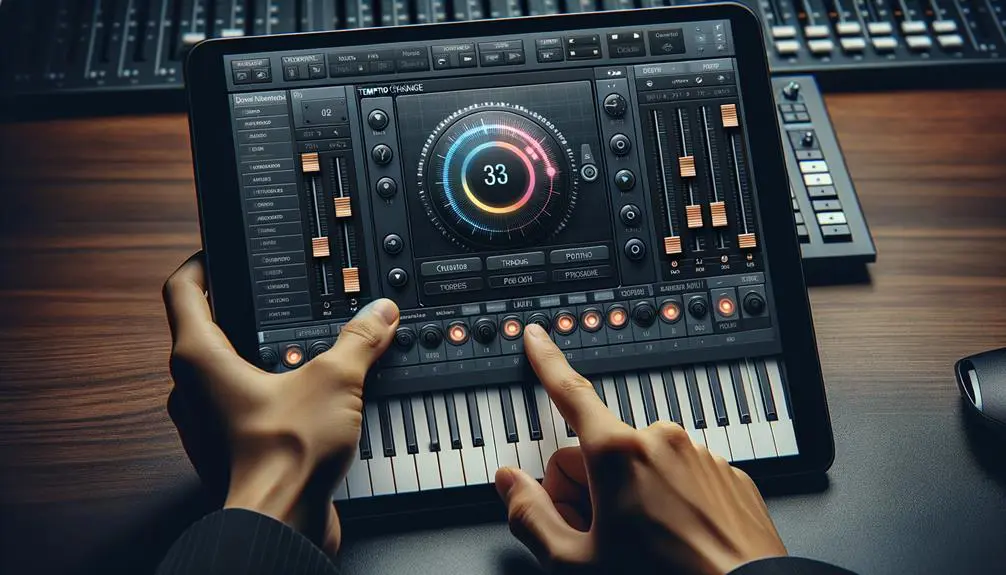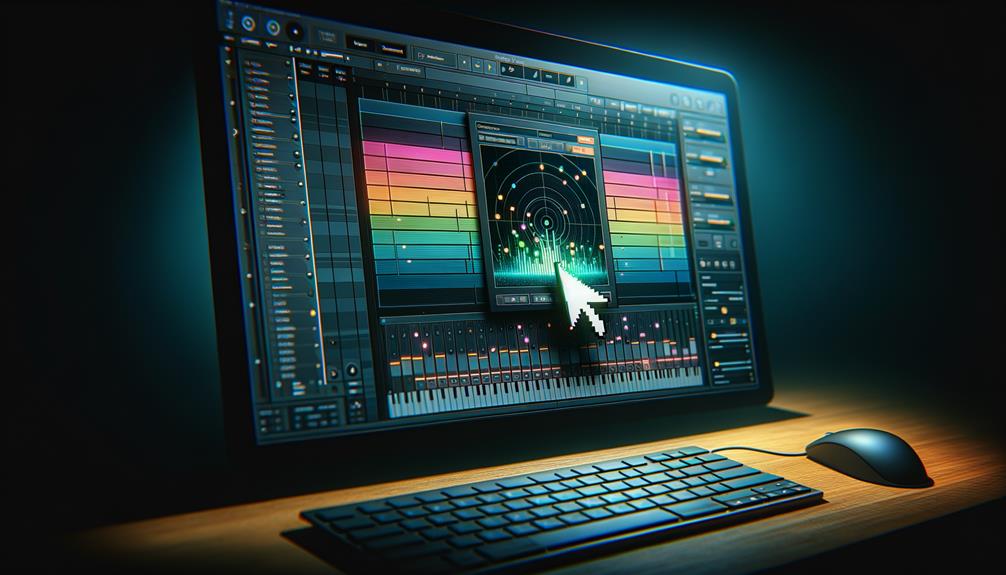No products in the cart.
Mastering Ableton can take you from a few weeks to several months, depending on your prior experience with digital audio workstations. You’ll start by grasping the interface basics, such as moving between session and arrangement views, creating tracks, launching clips, and mapping MIDI controls. As you grow more comfortable, you’ll delve into advanced topics like Max for Live, where you can intricately manipulate audio and edit MIDI with precision. For accelerated learning, mix regular practices with online tutorials and community engagement. Perfecting your skills involves applying techniques in new contexts and continuously setting detailed goals. Further exploration will greatly enhance your proficiency.
Contents
hide
Key Takeaways
- Learning the basics of Ableton can take a few weeks to several months, depending on prior experience with DAWs.
- Mastering advanced features, including Max for Live, requires dedicated practice and deeper understanding of the software.
- Regular practice sessions and setting specific, achievable learning goals are crucial for efficient mastery.
- Utilizing resources like Ableton’s tutorials, YouTube videos, and the official manual can significantly accelerate the learning process.
- Progress can be measured by setting clear goals and regularly assessing the ability to execute specific tasks within Ableton.
Understanding the Basics
To grasp the fundamentals of Ableton, you’ll typically need anywhere from a few weeks to several months, depending on your prior experience with digital audio workstations. If you’re new to DAWs, you’re starting from square one, and the foundational knowledge you need to acquire is extensive. You’ll begin by understanding the user interface and core features of Ableton, such as session view versus arrangement view, which are key concepts that differentiate Ableton from other DAWs.
Diving into basic techniques and essential skills, you’ll explore track creation, clip launching, and MIDI mapping. These elements are important for effectively maneuvering within Ableton’s environment. Additionally, studying the manual and engaging with tutorial videos from Ableton’s official site or YouTube will deepen your understanding, providing practical insights into applying these basic techniques in real-world scenarios.
Gaining proficiency in these areas forms a robust foundation for your further exploration of Ableton. Remember, the depth of your foundational knowledge directly influences the speed and ease with which you’ll master more complex features later on. Therefore, dedicating time to thoroughly understand these basics is indispensable for your growth as an Ableton user.
Mastering Advanced Features

Once you’ve mastered the basics of Ableton, delving into its advanced features will greatly enhance your music production capabilities. The journey into advanced territories such as Max for Live, intricate audio manipulation, and complex MIDI editing isn’t just about learning; it’s about mastering an array of tools that can transform your creative workflows. This stage is where your skills in sound design and mastering come to the fore, pushing the boundaries of what you can achieve with music production.
Here are key areas you’ll want to focus on:
- Max for Live: Access custom devices and experiment with building your own, enhancing your ability to personalize your sound and workflow.
- Advanced MIDI Editing: Utilize detailed MIDI manipulation to sculpt precise musical expressions and dynamics.
- Audio Manipulation Tools: Explore deep editing techniques that allow you to reshape samples and recordings into completely new sounds.
Understanding these advanced tools requires not only technical knowledge but a commitment to continual learning and experimentation techniques. As you grow more comfortable with these features, you’ll find your ability to innovate and craft distinctive sounds is only limited by your imagination.
Learning Through Practice
Diving into regular practice sessions is essential for mastering Ableton’s complex suite of music production tools efficiently. By carving out dedicated time to explore, you’ll reinforce vital concepts and accelerate your skill development. It’s not just about repeating what you know; it’s about pushing the boundaries of your understanding and abilities.
Start by setting achievable, specific goals for each session. For instance, you might focus one day on mastering the use of Ableton’s Sampler tool, and another on experimenting with audio effects chains. This targeted practice not only keeps you engaged but also guarantees that you’re building a well-rounded skill set.
Next, integrate practice techniques that challenge you to apply what you’ve learned in new and unfamiliar ways. Try reconstructing tracks from your favorite artists or remixing songs from different genres. These exercises will deepen your mastery of Ableton’s features and enhance your creative problem-solving skills.
Resources for Accelerated Learning

Utilizing online resources like Ableton’s official tutorial videos can significantly accelerate your learning process. These videos offer structured guidance that can enhance your understanding and mastery of Ableton’s complex functionalities. As you explore these resources, you’ll find that combining online tutorials with consistent practice is essential. It not only solidifies your theoretical knowledge but also sharpens your practical skills.
Here are some invaluable resources to explore:
- YouTube Demonstrations: Various experienced users and professionals share their insights and special techniques, offering practical demonstrations that are vital for enhanced learning.
- Reading the Official Manual: This can provide you with detailed, technical insights into Ableton’s myriad features, helping you understand the foundational aspects and advanced functionalities.
- Community Forums and Support: Engage with other learners and seasoned users. This platform allows for the exchange of tips and encourages experimentation, fostering a deeper understanding through shared experiences.
Measuring Your Progress
To effectively measure your progress in learning Ableton, set clear, achievable goals and regularly assess your ability to perform specific tasks within the software. Start by outlining a series of objectives that correspond to the essential functions and features of Ableton, as highlighted in the user manual.
For instance, you might set a goal to master clip launching or to efficiently use the session view within the first month.
Tracking progress in Ableton isn’t just about ticking off goals; it’s critical to reflect on the ease and speed with which you execute these tasks. If you’re shifting from another DAW, recognize that differences in workflow could affect your pace. Use this insight to adjust your expectations and goals accordingly.
Frequently Asked Questions
Is It Easy to Learn Ableton?
Learning Ableton’s interface navigation and mastering creative workflows isn’t straightforward. You’ll need patience and practice to become proficient, especially if you’re adapting from another DAW. Tutorials can greatly ease this learning process.
How Much Time Does It Take to Learn Ableton Live?
You’ll find that learning Ableton Live varies; course options and skill progression influence the timeline. It might take months to years, depending on your background and the depth of expertise you’re aiming for.
Can I Learn Ableton Myself?
Yes, you can learn Ableton yourself using self-teaching resources and online tutorials. Immerse yourself in the manual for deep insights and apply what you learn through practice to master its extensive features efficiently.
Is Ableton a Good DAW for Beginners?
Yes, Ableton is a solid DAW for beginners, offering an intuitive interface and robust features. Conducting a feature comparison and cost analysis, you’ll find it balances functionality with affordability effectively.
Conclusion
As you dive deeper into Ableton, you’ll find that consistent practice is key. Aim to master the basics within a few weeks, while advanced features might take months to years, depending on your dedication and prior experience.
Utilize forums, tutorials, and online courses to accelerate your learning curve. Regularly track your progress by setting specific goals and recording your sessions.
Remember, proficiency in Ableton isn’t just about knowing the tools, but creatively integrating them into your music production process.




